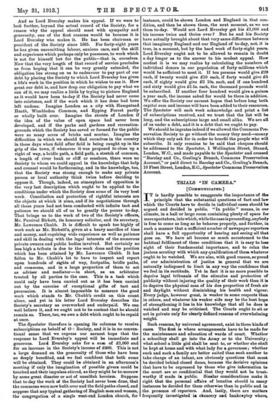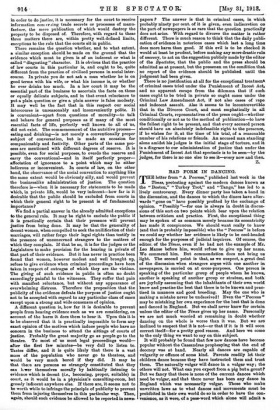I T is hardly possible to exaggerate the importance of the
principle that the substantial questions of fact and law which the Courts have to decide in individual cases should be argued and decided in public. "In public" means, in our climate, in a hall or large room containing plenty of space for mere spectators, into which, while the case is proceeding, anybody is free to come as long as he behaves properly, and further, in such a manner that a sufficient number of newspaper reporters shall have a full opportunity of hearing and seeing all that goes on. We have all become so much accustomed to the habitual fulfilment of these conditions that it is easy to lose sight of their fundamental importance, and to relax the jealous scrutiny with which any qualification of theta whatever ought to be watched. We are also, with good reason, so proud of our administration of justice in general that we are naturally indisposed to limit in any way the confidence that we feel in its rectitude. Yet in fact it is no more possible to deprive legal tribunals of the stimulus and protection of publicity without injuring the quality of their work than it is to deprive the physical man of his due proportion of fresh air and daylight without diminishing his health and vigour: Every judge, however great, is weaker in some respects than in others, and whatever his weaker side may be the best hope of strengthening it lies in his knowledge that all he does is watched and may be criticised. The Courts ought to sit or act in private only for clearly defined reasons of overwhelming weight.
Such reasons, by universal agreement, exist in three kinds of cases. The first is where arrangements have to be made for the maintenance and education of wards of court. Whether a schoolboy shall go into the Army or to the University; what school a little girl shall be sent to, or whether she shall be kept at home and with what lady for a governess ; whether such and such a family are better suited than such another to take charge of an infant, are obviously questions that must bo decided behind closed doors, because the decisive opinions that have to be expressed by those who give information to the oourt are so confidential that they would not be trust- worthy if made is public. Similar considerations make it right that the personal affairs of lunatics should in many instances be decided for them otherwise than in public and in the presence of reporters. And, lastly, there are matters frequently investigated ix chancery axd bankruptcy where, in order to do justice, it is necessary for the court to receive information corn er ling trade secrets or processes of manu- facture, the mere publication of which would destroy the property to be disposed of. Therefore, with regard to these three matters there are, within pretty well-defined limits, exceptions to the rule that the courts sit in public.
There remains the question whether, and to what extent, a similar exception should be made on the ground that the evidence which must be given is of an indecent or what is called " disgusting " character. It is obvious that the practice of law courts in this particular is, and ought to be, quite different from the practice of civilised persons in social inter- course. In private you do not ask a man whether be is on good terms with his wife, or what his income is, or whether he ever drinks too much. In a law court it may be the essential part of the business to ascertain the facts on these or equally delicate subjects, and in that event reluctance to put a plain question or give a plain answer is false modesty. It may well be the fact that in this respect our social intercourse is unreasonably and inconveniently polite. It is convenient—apart from questions of morality—to talk and behave for general purposes as if many of the most essential facts of life, perfectly well known to all of us, did not exist. The commencement of the nutritive process— eating and drinking—is not merely a conventionally proper subject of conversation, but is made an occasion for companionship and festivity. Other parts of the same pro- cess are mentioned with different degrees of reserve. It is possible, even for social purposes, to overdo the reserve and carry the conventional—and in itself perfectly proper— affectation of ignorance to a point which may be either ludicrous or inconvenient. In courts of law, on the other hand, the observance of the social convention to anything like the same extent would be obviously silly, and would prevent the businesslike administration of justice. The question therefore is—when it is necessary for statements to be made which, in private life, would be very indecent—how far is it desirable that the public should be excluded from courts in which their general right to be present is of fundamental importance ?
We find a partial answer in the already admitted exceptions to the general rile. It may be right to exclude the public if it is practically certain that their presence will prevent justice from being done. It may be that the generality of decent women, when compelled to seek the nullification of their marriages, will rather forgo their legal rights than testify in the presence of unconcerned strangers to the matters of which they complain. If that be so, it is for the judges or the Legislature to make provision for the hearing in private of that part of their evidence. But it has never in practice been found that women, however modest and well brought up, refuse to give evidence when criminal proceedings have been taken in respect of outrages of which they are the victims. The giving of such evidence in public is often no doubt exceedingly painful to the witnesses. They suffer that pain with manifest reluctance, but without any appearance of overwhelming distress. Therefore the proposition that the publicity of the evidence defeats the purpose of justice ought not to be accepted with regard to any particular class of cases except upon a strong and wide consensus of opinion.
A different question is, how far it is desirable to prevent people from hearing evidence such as we are considering, on account of the harm it does them to hear it. Upon this it is to be observed that it is practically impossible to form any exact opinion of the motives which induce people who have no concern in the business to attend the sittings of courts of justice. Probably the great majority go as people go to the theatre. To most of us most legal proceedings would— after the first few minutes—be very dull to listen to. Tastes differ, and it is quite likely that there is a vast mass of the population who never go to theatres, and would be very much bored if they did. It may be that these are persons so strangely constituted that they can leaver themselves morally by habitually listening to evidence which is decent (i.e., becoming, proper, suitable) in court, as it would be in a physician's consulting-room, but grossly indecent anywhere else. If there are, it seems not to be worth while to infringe the principle of publicity to prevent them from injuring themselves in this particular way. Then, again, should such evidence be allowed to be reported in news- papers P The answer is that in criminal cases, in which probably ninety per cent. of it is given, even indiscretion on the part of newspapers is so rare that the question practically does not arise. With regard to divorce the matter is rather different. There is much reason to think that the daily publi. cation of evidence in notorious cases which last a long time does more harm than good. If this evil is to be checked it would at least be prudent, before making any more drastic rule of secrecy, to act on the suggestion publicly made by the editor of the Spectator, that the public and the press should be admitted as at present, but the pressmen on the condition that no report of the evidence should be published until the judgment had been given.
There is no justification at all for the exceptional treatmen4 of criminal cases tried under the Punishment of Incest Act, and no apparent escape from the dilemma that if such cases ought to be tried in private so ought cases under the Criminal Law Amendment Act, if not also cases of rape and indecent assault. Also it seems to be incontrovertible that in the Divorce Court, and most emphatically in all Criminal Courts, representatives of the press ought—whether conditionally or not as to the method of publication—to have the fullest right to be present, and that every accused person should have an absolutely indefeasible right to the presence, if he wishes for it, at the time of his trial, of a reasonable number of his relations or friends. An accused man standing alone amidst his judges is the initial stage of torture, and it is a disgrace to our administration of justice that under the Punishment of Incest Act that spectacle is to be seen—by the judges, for there is no one else to see it—every now and then.
Z.



















































 Previous page
Previous page